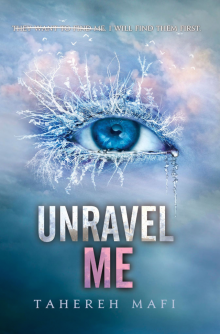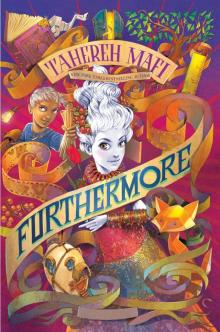- Home
- Tahereh Mafi
This Woven Kingdom Page 13
This Woven Kingdom Read online
Page 13
Alizeh could not help but think how strange it was that she worked in service. All her life she’d known she wanted to spend her life in the service of others, though not at all like this.
Life, it seemed, possessed a sense of irony.
Alizeh had been brought up to lead, to unify, to free her people from the half-lives they’d been forced to live.
Once, she’d been meant to revive an entire civilization.
The painful frost growing inside her veins was a primitive phenomenon, one thought lost to her people a millennia ago. Alizeh knew only a little of the abilities she was rumored to possess, for though there was an inherent power in the ice that pulsed through her, it was a power that could not be tapped until she came of age, and even then would not mature without the assistance of an ancient magic buried deep in the Arya mountains, where her ancestors had built their first kingdom.
And then, of course, she would require a kingdom.
The idea struck her as so preposterous it nearly made her laugh, even as it broke her heart.
Still, it had been at least a thousand years since there’d been news of a Jinn born with ice in their blood, which made Alizeh’s mere existence nothing short of miraculous. Nearly two decades ago whispers of Alizeh’s strange, cold eyes had spread among the Jinn the way only a rumor might, expectations building every day upon the slopes of her young shoulders. Her parents, who knew she would not be safe until she came of age at eighteen, had removed their daughter from the noisy, needy world, secreting her away for so long that the whispers, without fuel, were soon reduced to ash.
Alizeh, too, was forgotten shortly thereafter.
All those who knew of her had been killed, and Alizeh, who had no ally, no kingdom, no magic, and no resources, knew her life was best spent simply trying to survive.
She no longer had any ambition beyond a desire to live a quiet, undetected existence. In her more hopeful moments Alizeh dreamed of living somewhere lost in the countryside, tending to a flock of sheep. She’d sheer them every spring, using their wool to weave a rug as long as the world was round. It was a dream at once simple and implausible, but it was an imagining that gave her comfort when her mind required an escape.
She promised herself things wouldn’t always be this hard. She promised herself that the days would get better, bit by bit.
In fact, things were already better.
For the first time in years, Alizeh had company. And as if to remind her, the firefly nudged her neck.
Alizeh shook her head.
The firefly nudged her again.
“Yes, I know, you’ve made it very clear that you’d like me to come outside with you,” she said, scarcely breathing the words. “But as you can plainly see, I’m not allowed to leave this house at will.”
She could almost feel the firefly grieve. It wilted against her neck, rubbing one little arm over its eyes.
The creature had snuck into Baz House last night, during the brief window of time it took for the prince to open and close the back door. It had flown hard and fast in her direction, pelting her in the cheek with its little body.
It’d been so long since Alizeh had seen a firefly that, at first, she hadn’t recognized the creature. When she did, she smiled so wide she hardly knew herself.
Alizeh had been sent a firefly.
A communiqué.
From whom? She did not know. Though not for a lack of effort on the part of the insect. The poor thing had been trying to drag her outside since the moment it found her.
There was a special relationship between Jinn and fireflies, for though they could not communicate directly, they understood each other in ways unique only to the two species. Fireflies were to Jinn what some animals were to Clay. Beloved companions. Loyal friends. Comrades in arms.
Alizeh knew, for example, that this firefly was a friendly one, that it already knew who she was, and that it wanted now to guide her to a meeting with its owner. Though it appeared neither the firefly nor its owner understood the limits surrounding Alizeh’s freedom.
She sighed.
She took as much time as she dared scrubbing each delicate windowpane, enjoying the expansive view to the outside. It was rare that she was afforded so much time to take in the beauty of Setar, and she relished it now: the shattering, snowcapped Istanez mountain range in the distance; the frosted green hills in between. Dozens of narrow rivers fractured the landscape, the valleys blue with turquoise and rainwater, bookended on either side by miles of saffron and rose fields.
Alizeh was from the very north of Ardunia—from Temzeel province—an icy, elevated region so close to the stars she’d often thought she could touch them. She missed her home desperately, but she could not deny the splendors of Setar.
Without warning, the bell tolled.
It was noon, the morning now officially at an end. The sun had slid discreetly into position at the apex of the horizon, and Alizeh marveled at it through the glass, at the jolly warmth it emanated across the land.
She really was in a fine mood.
She recognized that it had been good for her to cry last night, to release a bit of the pressure in her chest. She felt lighter this morning, better than she had in a long ti—
The sponge dropped from her fingers without warning, landing with a dull thud in its soapy bucket, spraying her fresh snoda with dirty water. Anxiously, she dried her wet hands on her apron and pressed closer to the window.
Alizeh could not believe her eyes.
She clapped a hand over her mouth, overcome by an irrational happiness to which she was almost certainly not entitled. That wretched Fesht boy had nearly slit her throat; what reason did she have to be delighted to see him now? Oh, she didn’t know, and she didn’t care.
She couldn’t believe he’d come.
Alizeh watched him as he came up the walk, marveling anew at his shock of red hair and prematurely long frame. The boy was an entire head taller than her, and at least five years younger; it was a wonder to her how he grew at all for a child who ate so little.
The boy arrived at the fork in the footpath then, making a sharp right where he should’ve gone left, his unsettling choice directing him straight to the main entrance. When Alizeh was certain his vivid figure had disappeared for good, her joy evaporated.
Why had he gone to the front door?
She’d instructed the boy to come to the kitchens, not the main house. If she hurried right this second she might, under the pretense of collecting more water, be able to rush down to meet him. But if he was discovered at the front door not only would he be whipped for the impudence—she’d be cast out for having promised him bread.
Alizeh sat back, her heart racing at the thought.
Was this her fault? Should she have explained things more thoroughly to the boy? But what street child was deluded enough to think he might be admitted through the front door of a grand estate?
She dropped her face in her hands.
The firefly fluttered its wings against her neck, asking the obvious question.
Alizeh shook her head. “Oh, nothing,” she said softly. “Just that I’m fairly certain I’ll be thrown out onto the street . . . any minute now.”
At that, the firefly grew animated, taking flight and tossing its body once more at the window.
Bop. Bop.
Alizeh couldn’t help her smile then, however reluctant. “Not in a good way, you silly creature.”
“Girl!” A familiar voice barked at her.
Alizeh froze.
“Girl!”
In a flash, the firefly flew up the cuff of Alizeh’s sleeve, where it shuddered against her skin.
Alizeh turned slowly from her seat in the window bay to face Mrs. Amina, where the housekeeper somehow managed to tower over her even from below.
“Yes, ma’am?”
“Who were you talking to?”
“No one, ma’am.”
“I saw your lips moving.”
“I was humming a song, ma
’am.” Alizeh bit her lip. She wanted to say more—to offer up a more robust lie—but she was warier than ever of saying too much.
“Your job is to disappear,” Mrs. Amina said sharply. “You’re not allowed to hum, you’re not allowed to speak, you’re not allowed to look at anyone. You don’t exist when you work here, especially when you’re abovestairs. Do I make myself clear?”
Alizeh’s heart was racing. “Yes, ma’am.”
“Get down here. Now.”
Alizeh’s body felt suddenly heavy. She climbed down the rickety wooden ladder as if in a dream, her heartbeats growing louder as she went. She kept her eyes on the ground as she approached the housekeeper.
“Forgive me,” she said quietly, keeping her head down. “It won’t happen again.”
“I daresay it will not.”
Alizeh braced herself, waiting for what seemed the inevitable strike, when Mrs. Amina suddenly cleared her throat.
“You have a guest,” she said.
Very slowly, Alizeh looked up. “I beg your pardon, ma’am?”
“You may meet him in the kitchen. You will have fifteen minutes.”
“But— Who—”
“And not a minute more, do you understand?”
“Y-yes. Yes, ma’am.”
Mrs. Amina marched off, leaving Alizeh sagging in place. She couldn’t believe it. A visitor? It had to be the boy, did it not? The Fesht boy.
And yet— How could a street child have been admitted into the home of a duchess? How might he then be granted an audience with the lowest servant in the order?
Oh, her curiosity would not quiet.
Alizeh did not walk, but flew to the kitchens, lifting her sleeve to her mouth as she went. “It looks as if I won’t be tossed into the street after all,” she breathed, hardly daring to move her lips. “That’s good news, isn’t it? And now I’ve got a . . .” She trailed off, slowing down when she realized she could no longer feel the firefly’s legs on her arm, nor its wings against her skin. She peered inside her sleeve.
“Where are you?” she whispered.
The firefly was nowhere to be found.
Sixteen
THE AFTERNOON ROSE BRIGHT AND clear, the sun proud in the sky. The prior evening’s storm had washed clean the city of Setar, leaving in its wake a freshness and clarity its crown prince did not share.
Kamran sighed in the direction of the sun, cursing its shine, its beauty. He’d been swallowed whole by many a dark mood in his eighteen years, but his disposition at this hour was singularly volatile.
Still, the boy was not cruel.
He knew better than to grant such darkness an audience, and had abandoned the palace for Surati Forest, whose towering pink trees were like something out of a dream. It was one of the prince’s favorite places, not only for its beauty but for its seclusion, for it was accessible only by mountain cliff—from which one was required to jump, and often to their death.
Kamran never much minded this risk.
He’d brought with him only a small, patterned red rug, which he’d unfurled upon the snowy forest floor, and upon which he now reclined. He stared impassively at the impressive grove, the fluorescent pink trunks and their fluorescent pink leaves. Fresh snowfall had obscured the miles of green moss blanketing the ground, but the endless white drift lent its own cold beauty to the scene.
Kamran closed his eyes as a breeze skated along his face, mussing the glossy black waves of his hair. He heard the sweet chirp of a pair of songbirds, the buzz of a rare dragonfly. The hawk circling high above might’ve witnessed only a young man in repose, but the humble ant would’ve known better, would’ve felt the violent tremble emanating from his limbs, fracturing across the forest floor.
No, Kamran’s anger could not be contained.
It was no wonder, then, that he remained undisturbed as he lay exposed in the middle of uncharted land. Snake and spider, scarab and snow leopard, insects large and small, bears both white and brown. They all knew to give the young prince a wide berth, for there was no greater repellant than anger, and the woods shook with this warning now.
Today, Kamran had begun to doubt everything.
He had felt only sadness upon leaving his grandfather’s rooms that morning, but as the day wore on and his mind continued to work, his anger had grown over him like ivy. He was experiencing the grief of disillusionment, going over and over again in his mind his every memory of his grandfather; every moment he’d thought the man just and benevolent. All that King Zaal had done for the common good—had it been only in the interest of his own protection?
Even now he heard his grandfather’s voice in his head—
In fact I’d thought for certain I’d once found her
I assumed her dead some years ago
Kamran had not questioned the statement when first spoken by the king, but now, at his leisure, he combed over every word of their earlier conversation, turned it inside out for analysis.
What had his grandfather meant when he’d said he was surprised the girl was alive? Did that mean he’d tried to kill her before?
Some years ago, he’d said.
The girl couldn’t have been a day older than Kamran—of that, he felt certain—so what conclusion was he left to draw? That his grandfather had tried to murder a child?
The prince sat up, dragged his hands down his face.
He knew, intellectually, that these were not ordinary circumstances.
That the girl’s animus had been foretold by the Diviners meant a great deal, for the mouths of the priests and priestesses were touched with binding, brutal magic before they were even allowed to take their vows. They were as a result beings physically incapable of telling lies, and whose prophecies were the fodder of legend.
Never once had they been wrong.
But try as he might shape his heart to the painful context of the situation, the prince could not condone the killing of an innocent. He could not fathom the murder of the girl, not now, not for the crime of merely existing.
So it had become, in the aftermath of their meeting, critically important to Kamran to reconcile his heart and mind. He’d wanted, desperately, to side with his grandfather, who in eighteen years had always treated Kamran with an abundance of love and loyalty. The prince could learn to accept his grandfather as imperfect; all else might be forgiven if he could only prove today the merit of the king’s argument—that the girl was indeed a threat. It was with this in mind that the prince had consoled himself with a single plan of action:
He would find evidence.
He would prove to himself that the girl was plotting against the crown; that she had ambitions of bloodshed; that she hoped to incite a revolt.
It certainly seemed possible.
For the more he’d thought on it, the more impossible it seemed to Kamran that the girl did not know who she was.
On that score, his grandfather had to be right. Why else the refinement, the elegance and education, the knowledge of multiple languages? She’d been bred for royalty, had she not? Was it not a disguise, the lowering of herself into obscurity? Was not the snoda merely an excuse to hide her unusual eyes, which were likely proof of her identity?
Devils above, Kamran had not been able to decide.
For it was not entirely a performance, was it? She worked every day for her living, scrubbed the floors of her lessers, cleaned the toilets of a gentlewoman.
Deeply agitated, Kamran had drawn his hood low over his head, pulled the chain mail over his face, and gone straight from his grandfather’s chambers into the center of town.
He’d been determined to find reason in what seemed like madness, and the parcels seemed his straightest path to clarity.
Kamran had recognized their seal the night prior; they were from the apothecary in town. Only this morning had it occurred to him that the girl might’ve overreacted to their loss. It had suddenly seemed strange to him that anyone would grow hysterical at the thought of losing a few medicinal herbs—items that we
re easily found, easily replaced.
It was possible, then, that there was more to their contents.
The parcels might help prove her hand in some nefarious scheme, tie her to some underhanded plotting; uncovering their truth might establish her as a real threat to the empire. It was perhaps not too late, he’d consoled himself, to find a way to support the king’s decision against her.
So he’d gone.
It was a simple matter for him to locate the apothecary, disguise himself as a magistrate, ask questions of the proprietor. He’d pretended to be going shop to shop, asking questions about possible criminal acts committed during the previous evening’s revelry, and had hounded the poor man for every detail concerning his late-night customers.
One, in particular.
“Sir, I confess I don’t understand,” the proprietor had said nervously. He was a wiry man, with black hair and brown skin; a man named Deen. “She purchased only what I recommended for her injuries, nothing more.”
“And what had you recommended?”
“Oh,” he said, faltering a bit as he remembered. “Oh, just—well, there were two different kinds of salve. She had very different injuries, sir, though both treatments were meant to help with the pain and guard against infection, albeit in slightly different ways. Nothing unusual. That was all, really. Yes, it was just some salve and—and some linen bandages.”
Salve and linen bandages.
She’d fallen to her knees in the gutter to save a few coppers’ worth of salve and linen bandages?
“You’re quite certain?” Kamran had asked. “There was nothing else—nothing of considerable value? Nothing particularly precious or expensive?”
At this, the tension in Deen’s body seemed to vanish. The apothecarist blinked curiously at the man wearing a face of chain mail—the man he considered a magistrate—and said, with surprising calm, “When a person is in tremendous pain, sir, is not its remedy worth everything? Valued above all else?”
Kamran managed an indifferent tone when he said, “You mean to say the girl was in tremendous pain?”
“Most certainly. She did not complain of it aloud, but her wounds were severe and had been festering all day. I’ve witnessed many a man in my shop weep over lesser injuries.”

 Shatter Me
Shatter Me Restore Me
Restore Me Destroy Me
Destroy Me Unravel Me
Unravel Me Ignite Me
Ignite Me Defy Me
Defy Me Fracture Me
Fracture Me Shadow Me
Shadow Me Whichwood
Whichwood Reveal Me
Reveal Me Furthermore
Furthermore Shadow Me (Shatter Me Novella)
Shadow Me (Shatter Me Novella) Believe Me
Believe Me Restore Me (Shatter Me)
Restore Me (Shatter Me) Imagine Me
Imagine Me An Emotion of Great Delight
An Emotion of Great Delight Find Me
Find Me A Very Large Expanse of Sea
A Very Large Expanse of Sea Unravel Me: The Juliette Chronicles Book 2
Unravel Me: The Juliette Chronicles Book 2